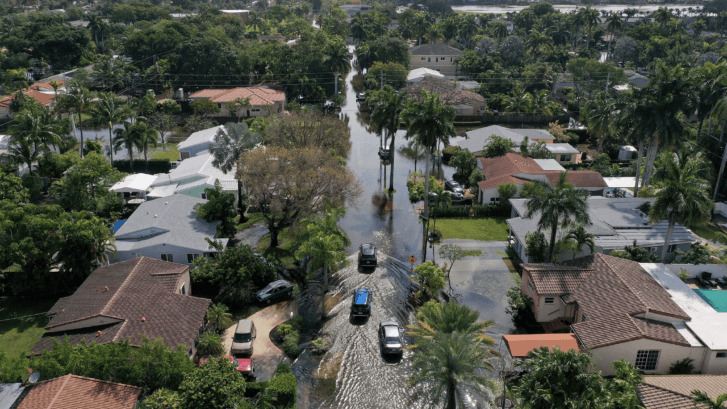Staying Safe In Flooding Events
In light of last month’s flood disaster in Fort Lauderdale, and the fact that such events are happening more often, our primary care concierge doctors in Jupiter want to review what you should know to stay safe in similar situations.
Not only are extreme flooding events more likely these days, but here on the east coast of Florida we also regularly deal with the threat of hurricanes. And with hurricane season arriving in just a few weeks, it pays to be prepared.
More to Come
In the aftermath of the Fort Lauderdale flooding, Kevin Guthrie, director of the Florida Division of Emergency Management, said, “This is the second most-catastrophic flooding event that I’ve seen in my tenure as emergency manager . . . over the last 33 years,” with Hurricane Ian being the worst.
Unfortunately, with the changing climate, such events are becoming more common, both in Florida and across the country. Warmer air holds more water vapor than cooler air, thus intensifying rainfall amounts.
The National Weather Service (NWS) reports that flooding kills more people than almost any other weather-related hazard. That’s why it’s important to know what to do in storm emergencies.
Before the Storm
- Be sure you have a 30-day supply of your medications—both prescription and non-prescription—on hand before the storm hits. See us if you need refills of any drugs you may be taking.
- If your medications need to be refrigerated, talk to us about how to keep them properly stored if your power goes out.
- If you are on dialysis, talk to the doctors or staff at the dialysis center about where to go after the storm.
- If you use medical devices such as ventilators or oxygen concentrators, be sure the batteries are fully charged, and know where to go if the battery doesn’t work.
- If you are on a special diet, be sure to have enough food available to last at least a week. And have enough bottled water available for everyone in the household to prevent dehydration. The rule of thumb is one gallon per person per day.
- If you have service animals or pets, ensure they have enough water, food, and any medications to last at least 10 days after the storm.
- Be sure to have plenty of hand sanitizers and hand wipes available.
- Make sure to take all your medical paperwork with you if you evacuate: a list of current medications, a list of drug allergies, insurance cards, and contact numbers for your physicians.
- If you haven’t had a tetanus vaccine in the past 10 years, see us now to be inoculated. During after-storm cleanup, tetanus bacteria can infect you from even a minor cut or scratch.
Driving Safely
Flash floods are caused by slow-moving thunderstorms, or storms that move over the same area one right after the other, known as “training,” because they follow each other like train cars. The NWS says that most deaths associated with floods occur at night or when people become trapped in cars that stall while driving in flooded areas.
In April’s flooding, CNN reported that a month’s worth of rain fell on Fort Lauderdale in just one hour. Many of the city’s streets turned into lakes as two feet of rain left over 1,000 people calling for help.
If you encounter flooding, remember: Turn around, don’t drown. It takes just a foot of water to float a car; two feet will float most vehicles, including pick-up trucks.
One final tip from the man who helped create the “turn around, don’t drown” slogan: Hector Guerrero, formerly with the NWS, tells NPR that floodwaters can make it challenging to open car doors or windows. That’s why he keeps a safety hammer in his car in case he gets stuck in rising waters.
“You hit the corner of that windshield,” he says. “You can break it out if it has to come to that.”
Then head to higher ground: a nearby hill, a building, or even a tree.
After the Storm
Many deaths and injuries occur after a disaster. So here’s what you need to know to stay safe.
- Avoid floodwaters if at all possible. They are filled with such contaminants as oil and gas, infectious diseases, household chemicals, and sewage, not to mention displaced animals. Water may also cover potholes and sinkholes.
- If you’re using a generator to maintain power, be sure it’s far enough away from the house to prevent carbon monoxide from seeping into the home.
- Do not eat any food or water that may have come into contact with floodwater. If in doubt, throw it out.
- If lifesaving drugs have been exposed to floodwaters, the U.S. Food and Drug Administration (FDA) says that if the container is contaminated but the contents appear unaffected (i.e., the pills are dry), they may be used until replacements are available. Other types of drugs or drug products such as inhalers, oral liquids, drugs for injections, and so forth, should be discarded if they have come in contact with contaminated water.
- Insulin loses its potency according to the temperature it is exposed to and the length of the exposure. Under emergency conditions, you might still need to use insulin that has been stored above 86 degrees Fahrenheit. When a fresh supply becomes available, discard any questionable insulin remaining.
- Take care during cleanup. Be aware of downed power lines, the hazards of power tools like chainsaws, and the dangers of overexertion and heat.

